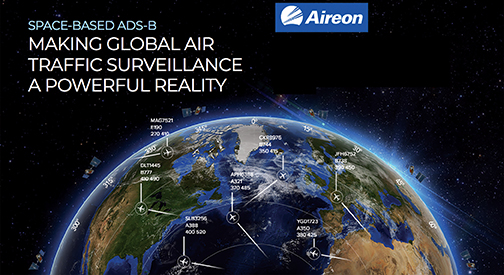
Aireon's space-based Automatic Dependent Surveillance-Broadcast (ADS-B) payload was successfully deployed during the eighth and final launch and positioning of the Iridium NEXT satellite constellation — at 7:31:33 AM PST (15:31:33 UTC) on January 11, a SpaceX Falcon 9 rocket lifted off from Vandenberg Air Force Base in California and placed the final 10 Iridium NEXT satellites into LEO.
This launch brought the total number of Aireon payloads in orbit to 75 (66 operational payloads and 9 spares), completing the historic launch program and passing one of the last remaining milestones before Aireon ushers in a new era of global air traffic surveillance and aircraft tracking.
Aireon is the world’s first 100 percent global air traffic surveillance system and is revolutionizing the way the world travels with space-based technology. Unlike existing aircraft surveillance and tracking infrastructure, the Aireon system uses space-based ADS-B technology, which enables the automatic and real-time collection of aircraft position data. The Aireon technology gives air traffic controllers and airlines a complete and comprehensive view of the entire sky, like never before. With this upgraded insight into the world’s flight paths, including those in remote and oceanic airspace, the entire industry will experience significant direct and indirect benefits such as, increased safety, more efficient flight routes, more accurate arrival and departure predictions, faster emergency response times, reduced aircraft separation, a decrease in CO2 emissions and more.
Thus far, the Aireon system has out-performed all predictions and is processing more than 13 billion ADS-B messages per month, with that number expected to grow upon full deployment. Air traffic controllers rely on the best and most accurate surveillance data possible to separate aircraft, which is often achieved through multiple redundant layers. Aireon’s data will provide air traffic controllers with a fully redundant data feed that covers the entire airspace, increasing the availability and reliability of a critical component in air traffic management, with a positive impact on safety and efficiency. This will in turn, help improve flight optimization by eliminating gaps in fleet data reports, and ultimately enhance the overall safety, accuracy and efficiency of worldwide air travel.
This launch marks the completion of the Iridium NEXT launch campaign, successfully deploying the full Aireon system.
Executive Comments
Don Thoma, the CEO of Aireon, said that the company has passed a major milestone on the firms journey to revolutionize air traffic surveillance and the company is just weeks away from a fully operational system. Now that the launches are complete, final integration and testing of the recently launched payloads can commence, after which the world’s first, real-time, truly global view of air traffic will be a reality. It’s difficult to contain the excitement until all is formally operational, especially as from a performance standpoint, the company's technology has far exceeded expectations. Many may think this is the end of a journey, being the last Iridium NEXT launch; however, for Aireon, this is the start of a new way air traffic will be managed.
Marion Blakey, former Administrator at the Federal Aviation Administration (FAA), added that Aireon’s space-based ADS-B network is just what the aviation industry needs. During my time at the FAA, extensive work was done to promote ADS-B technology for global air traffic management efforts. Today’s successful launch is a victory for Aireon as well as for the aviation industry — one step closer to having a clear, accurate and complete picture of the world’s airspace, including over the oceans and remote areas. (Blakey now serves on the Aireon U.S. Advisory Board alongside its Chairman, The Honorable Norman Mineta and Vice-Chairman, Russ Chew.)

